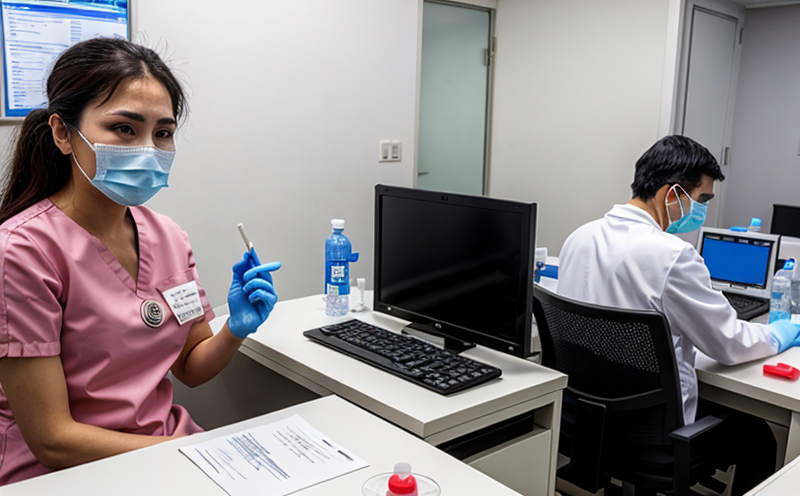Taura Syndrome Virus (TSV) Serology Testing in Shrimp
The Taura Syndrome Virus (TSV), a member of the Languipesvirus genus, is an icosahedral virus with an enveloped structure. This virus specifically targets Penaeid shrimp and causes significant economic losses to the aquaculture industry worldwide. The most notable impact is the acute disease known as Taura Syndrome Disease (TSD), which results in high mortality rates among affected shrimp populations.
Given its critical role, TSV serology testing serves a crucial function for both researchers and aquaculturists. This test allows for the early detection of viral presence and the assessment of herd immunity within cultivated populations. By understanding the prevalence of antibodies against TSV in a population, aquaculture operations can make informed decisions regarding biosecurity measures, breeding programs, and vaccination strategies.
Our testing service is designed to provide accurate and reliable serological analysis through advanced immunological techniques tailored specifically for this virus. The methodology typically involves collecting serum samples from shrimp subjects followed by an ELISA-based assay that detects the presence of TSV-specific antibodies in these samples. This approach ensures precise identification even at low antibody levels, making it a valuable tool in monitoring disease dynamics.
The importance of this testing cannot be overstated; it enables proactive management practices aimed at minimizing outbreak risks and maintaining sustainable shrimp populations. Regular surveillance through serology can help identify potential hotspots early, allowing for targeted interventions before the virus spreads further.
Compliance with international standards such as ISO 15143-2 is ensured throughout our testing process to guarantee high-quality results that are trusted by regulatory bodies and industry professionals alike. Our experienced team of scientists ensures every step from sample collection to final reporting meets stringent quality control criteria, providing you with confidence in the accuracy and reliability of your test outcomes.
For those involved in research or commercial operations dealing with shrimp health management, this service is an indispensable resource for ensuring optimal production environments while safeguarding against costly disruptions caused by TSV outbreaks.
Scope and Methodology
The scope of our TSV serology testing encompasses a comprehensive set of procedures aimed at providing detailed insights into the prevalence and distribution of antibodies specific to this virus within shrimp populations. This includes collecting serum samples from various stages of development, including fry, juveniles, and adult shrimp.
- Sample Collection: Samples are collected using sterile techniques to avoid contamination with other pathogens or environmental factors that could skew results.
- Preparation: The samples undergo rigorous preparation steps ensuring they remain stable during transport and storage until they reach our laboratories for analysis.
The methodology employs a standardized enzyme-linked immunosorbent assay (ELISA) which has been validated against known positive controls derived from naturally infected shrimp. This ensures consistent detection rates regardless of sample source or batch variation.
- Antibody Detection: The ELISA test utilizes monoclonal antibodies specific to TSV antigens immobilized onto microtiter plates.
- Data Analysis: Post-incubation with the sample, any bound antibodies are detected via a colorimetric reaction. The intensity of this color change directly correlates with the level of TSV-specific antibodies present in the serum.
The results from these analyses provide robust evidence regarding the presence and extent of exposure to TSV among tested populations. These data can then be used by stakeholders involved in shrimp aquaculture to implement targeted control measures aimed at reducing disease incidence and enhancing overall productivity.
Benefits
- Early Detection: Identification of TSV antibodies early allows for swift implementation of containment strategies, preventing the spread of the virus among shrimp populations.
- Informed Decision Making: Accurate information about the health status of a population supports better management decisions related to breeding programs and biosecurity protocols.
- Enhanced Productivity: By maintaining healthy stocks free from TSV, there is an increase in yield and quality of harvested shrimp.
- Regulatory Compliance: Adherence to international standards ensures compliance with relevant regulations governing aquaculture practices globally.
The benefits extend beyond immediate health concerns; they contribute significantly towards long-term sustainability goals within the industry. Through regular testing, stakeholders can stay ahead of emerging threats, ensuring continued success in their operations.
Environmental and Sustainability Contributions
The practice of TSV serology contributes positively to both environmental protection and sustainability efforts within the aquaculture sector. By identifying and managing TSV effectively, we help reduce the risk of mass mortality events which can lead to significant ecological imbalances.
- Reduction in Mortality: Minimizing losses due to TSD helps maintain balanced ecosystems where native species are less likely to be impacted negatively by overpopulation caused by die-offs.
- Economic Stability: Stable production levels contribute to sustainable economic growth within the aquaculture industry, supporting livelihoods and job creation.
- Biosecurity Measures: Implementing robust biosecurity practices based on accurate test results strengthens overall resilience against future outbreaks.
In addition to direct benefits for shrimp populations and associated industries, our services also promote responsible stewardship of natural resources. By preventing unnecessary disruptions and fostering healthier environments, we support broader environmental conservation objectives.





